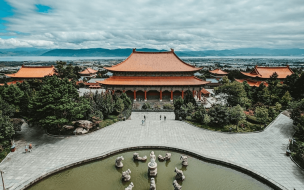As small business is increasingly encouraged, Leela Greenberg, an MBA student at China Europe International Business School (CEIBS) in Shanghai, sees a plethora of opportunities in China for aspiring entrepreneurs.
Born in Colorado, US, the self-confessed Sinophile spent the majority of her early professional life promoting cross-cultural cooperation in education, first working to implement a United Nations’ global awareness program across 212 public schools in Spain, and then travelling the world to establish an international partnership network for Vail Mountain School in the US.
Since relocating to China for her MBA, Leela has been blown away by the pace of change and has developed a new-found passion for tech such as drones and artificial intelligence.
What is the future for business in China?
In the coming decades we’ll see China conditioning to become a leader of innovation. Rather than copying the West, China will be able to export its own culture and [its] own business models to the rest of the world.
The world is going to change and I’m not scared; I’m excited. The Chinese are good people with good intentions. There’s a level of self-consciousness and pride that you can feel across the country.
What opportunities does this change present for entrepreneurship?
The government is more in favor of small businesses. One of Xi Jinping’s slogans is the “Chinese Dream”, [the idea] that you can be an entrepreneur and create opportunities for yourself in China rather than moving to another country.
Heroes in China aren’t popstars. Jack Ma, who started Alibaba, is the pop icon here. People talk about him on a daily basis.
Why did you decide to pursue an MBA at CEIBS?
I figured that rather than being industry-specific, diversifying into business at large would be more advantageous and more suitable for me.
I have an interest in China and Chinese culture and language. CEIBS is ranked [highly]….And has a very international student body, so it seemed like the best option.
How has your experience in China affected your career plans?
I’m getting very interested in tech — drones and artificial intelligence.
There’s a lot of opportunities here. Shenzhen is a tech manufacturing hub just south of Shanghai. DJI — the leading drone manufacturer in the world — is there. Companies in Europe and the US are copying drones that come out of Shenzhen.
I don’t plan to stay in China, but I do see myself working in development positions for companies looking to enter new markets. China is entering the global marketplace in a really big way, and understanding the culture here will be really useful to a lot of companies in the future.
How has China reacted to the recent economic downturn?
Chinese people are pretty resilient and there’s a lot of trust in the government.
The Chinese renminbi has been accepted as one of the world’s reserve currencies, so the government can’t regulate as much and the currency has naturally depreciated. It shows the sacrifices that China is going to make in its commitment to move forward as a global superpower.
What cultural differences have you encountered living in China?
Chinese people are very interested in learning about new cultures. A lot of foreigners notice that when they first go to Beijing and Tiananmen Square, people take pictures of them.
When I first came to China I came with an African American classmate of mine who had an afro. Random people would run up to him and grab his hair!
RECAPTHA :
f3
d5
9b
c1








